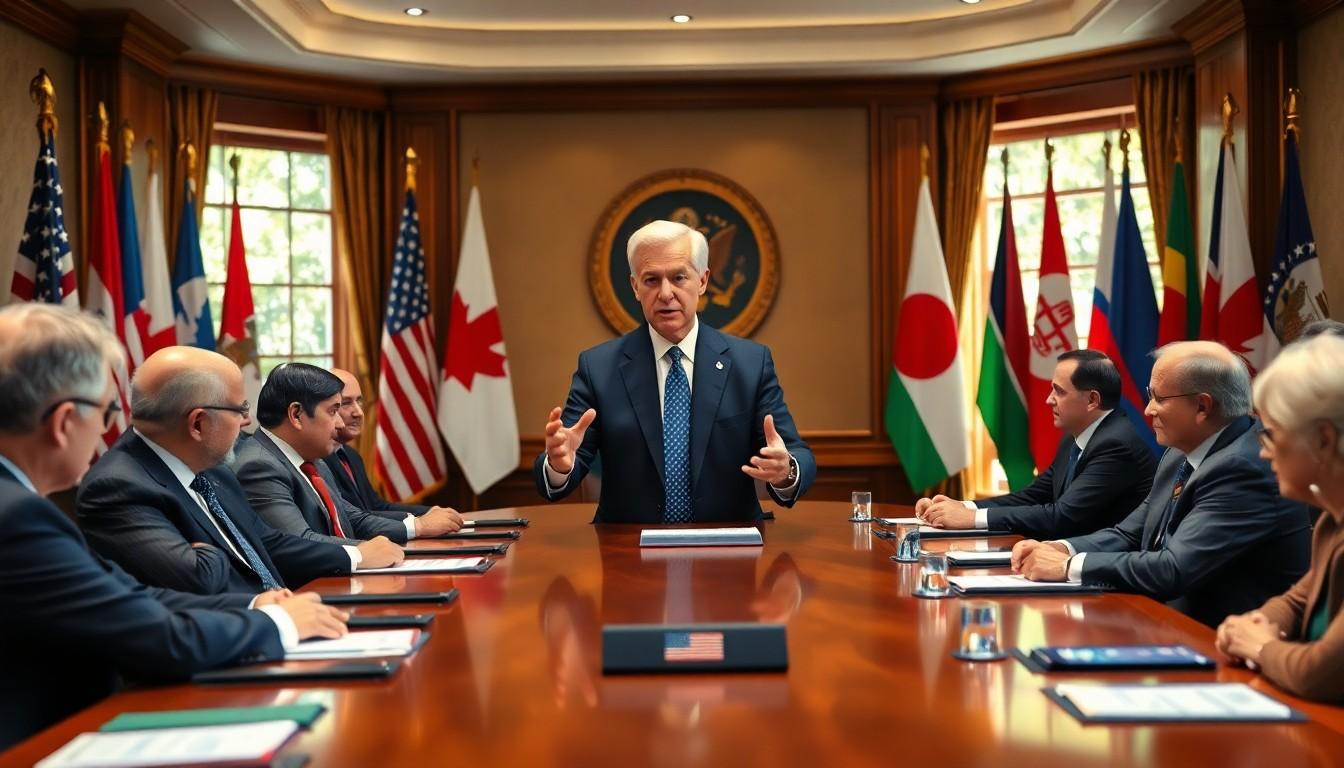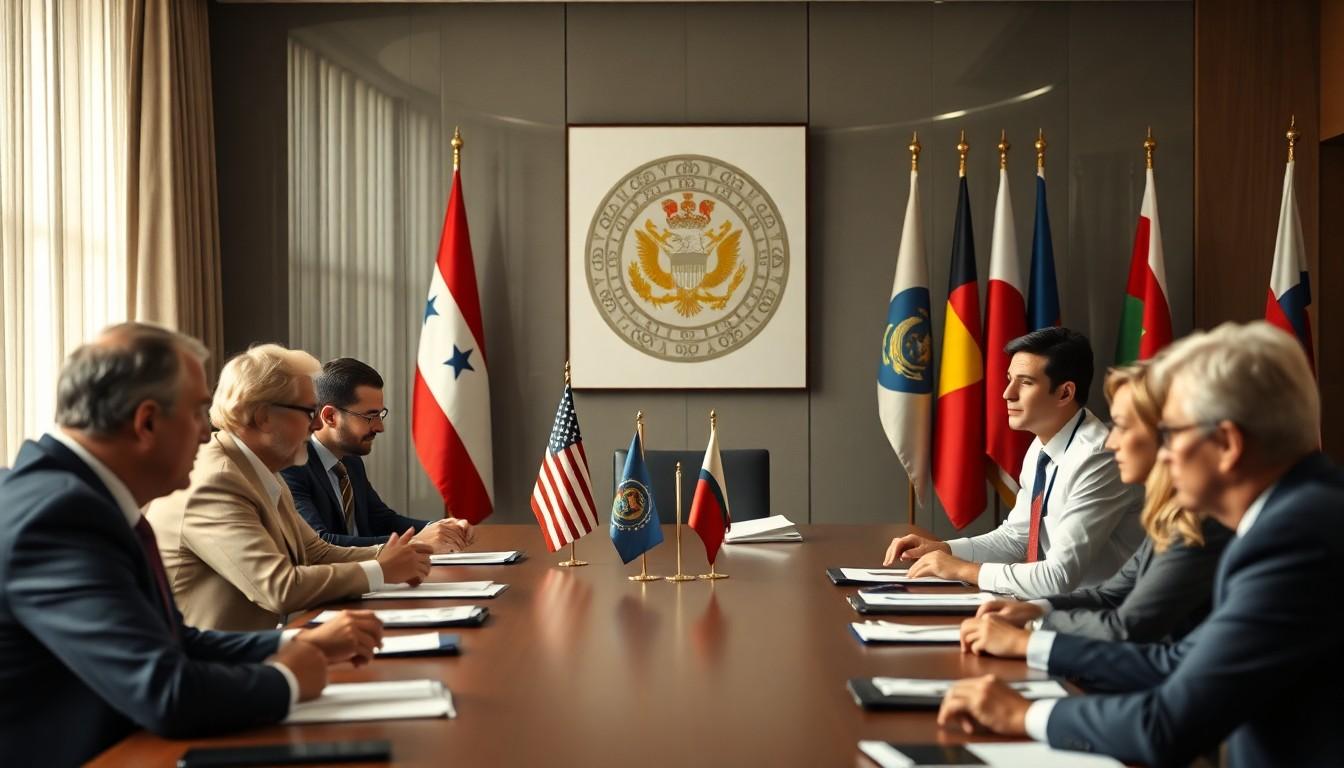The Best Fluffy Pancakes recipe you will fall in love with. Full of tips and tricks to help you make the best pancakes.

International Diplomacy: Secrets to Peaceful Negotiations in a Complex World
In a world where borders are often just lines on a map and misunderstandings can spark global chaos, international diplomacy steps in like a savvy negotiator at a family reunion. It’s the art of keeping peace while juggling the interests of nations, and let’s face it, it’s a lot more complicated than a game of chess. When countries come together to hash out their differences, it’s not just about who gets the last slice of pizza; it’s about securing a future where everyone can enjoy their slice without fear of a food fight.
From high-stakes summits to casual coffee chats, international diplomacy shapes the way nations interact. It’s a delicate dance of power, persuasion, and sometimes a pinch of humor. So buckle up as we dive into the fascinating world of international diplomacy, where the stakes are high, but the potential for cooperation is even higher.
International Diplomacy
International diplomacy plays a crucial role in shaping relationships among nations. It encompasses a range of activities aimed at managing international relations, maintaining peace, and fostering cooperation.
Definition and Importance
International diplomacy refers to the practice of negotiating and managing relations between countries. This process involves formal and informal exchanges, enabling states to communicate interests and resolve conflicts. Its importance lies in preventing wars, promoting trade, and enhancing global security. Effective diplomacy fosters mutual understanding and cooperation, which supports stability in international relations. Countries depend on diplomatic efforts to navigate complex issues such as climate change, human rights, and economic partnerships.
Historical Context
The history of international diplomacy dates back to ancient civilizations. Early forms involved emissaries negotiating treaties and alliances. The Peace of Westphalia in 1648 marked a significant moment, establishing principles of state sovereignty and non-interference. Diplomatic practices evolved further during the 19th century with the Congress of Vienna, which aimed to balance power among European nations. Major events, such as World War I and World War II, highlighted the necessity for robust diplomatic frameworks. After World War II, institutions like the United Nations were created, solidifying the role of diplomacy in addressing global challenges effectively.
Key Actors in International Diplomacy

Nations and their governments play a pivotal role in international diplomacy. Each country engages in diplomatic relations to protect its interests and promote its values. Countries like the United States, China, and Russia often dominate global discussions due to their political, economic, and military influence. Governments negotiate treaties, create alliances, and address conflicts. National leaders and diplomats engage in bilateral and multilateral talks to maintain stability and foster cooperation. They rely on established protocols and diplomatic etiquette to navigate complexities and achieve their objectives.
International organizations also significantly contribute to international diplomacy. Institutions such as the United Nations and the European Union facilitate dialogue and cooperation among member states. Organizations provide a platform for countries to address global issues such as climate change, security, and human rights. They often mediate conflicts and monitor compliance with international agreements. These entities enhance the collective diplomatic efforts of nations, promoting peace and security through collaborative frameworks. Multilateral meetings hosted by these organizations often result in resolutions that shape global policies and responses.
Diplomatic Strategies and Practices
Various strategies shape international diplomacy, each tailored to foster dialogue and cooperation among nations. Understanding these techniques benefits both policymakers and diplomats.
Negotiation Techniques
Diverse approaches underpin successful negotiations. Countries often utilize interest-based negotiation, highlighting mutual gains rather than positions. Active listening enhances comprehension, allowing diplomats to address underlying concerns effectively. Different cultural contexts necessitate adaptations in styles, promoting respect and understanding. Establishing common ground serves as a foundation for cooperation, enabling parties to build agreements that satisfy both sides. Utilizing third-party mediators often facilitates discussions when direct engagement falters. Trust-building exercises and transparent communication play essential roles in creating a conducive environment for dialogue.
Conflict Resolution
Conflict resolution strategies aim to address and mitigate disputes before escalation. Diplomats frequently employ mediation, bringing opposing parties together to facilitate productive discussions. Access to unbiased neutral parties enhances the process, fostering transparency and collaboration. Involvement of international organizations, such as the United Nations, often adds legitimacy and support in addressing conflicts. Facilitated dialogue maintains communication channels, allowing ongoing negotiations even during heightened tensions. Comprehensive peace agreements can emerge from focused discussions, often addressing root causes of conflicts and proposing actionable solutions. Promoting reconciliation efforts afterward ensures lasting peace and stability among nations.
Challenges in International Diplomacy
International diplomacy faces numerous challenges that can impede effective communication and cooperation among nations.
Geopolitical Tensions
Geopolitical tensions often arise from competing national interests and territorial disputes. Countries may experience heightened conflicts during resource scarcity or shifts in power dynamics. Trust issues among nations complicate efforts to establish stable relationships, especially when military posturing and aggressive rhetoric are involved. In regions like the South China Sea or Eastern Europe, increasing tensions have led to alliances and counter-alliances, which complicate diplomatic negotiations. Nations must navigate these dynamics carefully while addressing the core issues that drive discord. Resolutions require strategic dialogue, patience, and often third-party mediation.
Cultural Differences
Cultural differences present significant barriers to successful international diplomacy. Varying beliefs, communication styles, and negotiation approaches can lead to misunderstandings or unintentional offenses. Diplomatic representatives must become culturally literate to navigate these complexities effectively. Understanding local customs, languages, and historical contexts enhances the ability to build rapport among nations. Misinterpretations frequently occur during negotiations, sometimes leading to stalled discussions. To foster constructive dialogue, diplomats should prioritize cultural sensitivity and adaptability in their interactions, ensuring that all parties feel respected and understood.
The Future of International Diplomacy
International diplomacy continues to evolve, influenced by various factors shaping its landscape.
Emerging Trends
New diplomatic approaches reflect shifting global dynamics. Countries increasingly engage in public diplomacy, utilizing social media outreach to connect with global audiences. Non-state actors, including NGOs and corporations, now play significant roles in fostering dialogue. Additionally, multilateral cooperation is vital for addressing transnational challenges, emphasizing the need for collaborative efforts on issues like climate change and security. Regional organizations gain prominence as platforms for dispute resolution, enhancing diplomatic flexibility among neighboring nations.
Role of Technology
Technology profoundly impacts international diplomacy, transforming communication methods. Video conferencing tools enable real-time discussions, making meetings accessible regardless of location. Data analytics assist diplomats in understanding public sentiment, enhancing strategic decision-making. Cybersecurity concerns also reshape diplomatic interactions, as nations must navigate the complexities of information warfare. Moreover, artificial intelligence offers predictive insights into geopolitical trends, empowering leaders to develop proactive strategies. Overall, integrating technology significantly enhances the effectiveness and reach of diplomatic efforts worldwide.
International diplomacy remains a cornerstone of global stability and cooperation. As nations navigate complex relationships and pressing challenges, the role of skilled negotiators becomes ever more critical. The evolution of diplomatic practices reflects the dynamic nature of international relations, highlighting the need for adaptability and cultural understanding.
Emerging trends and technological advancements are reshaping how diplomacy is conducted, allowing for more effective communication and collaboration. As the world faces multifaceted issues, the commitment to diplomacy will be essential in fostering peace, promoting trade, and addressing global concerns. The future of international diplomacy hinges on the ability of nations to engage constructively and work towards a shared vision for a harmonious world.
